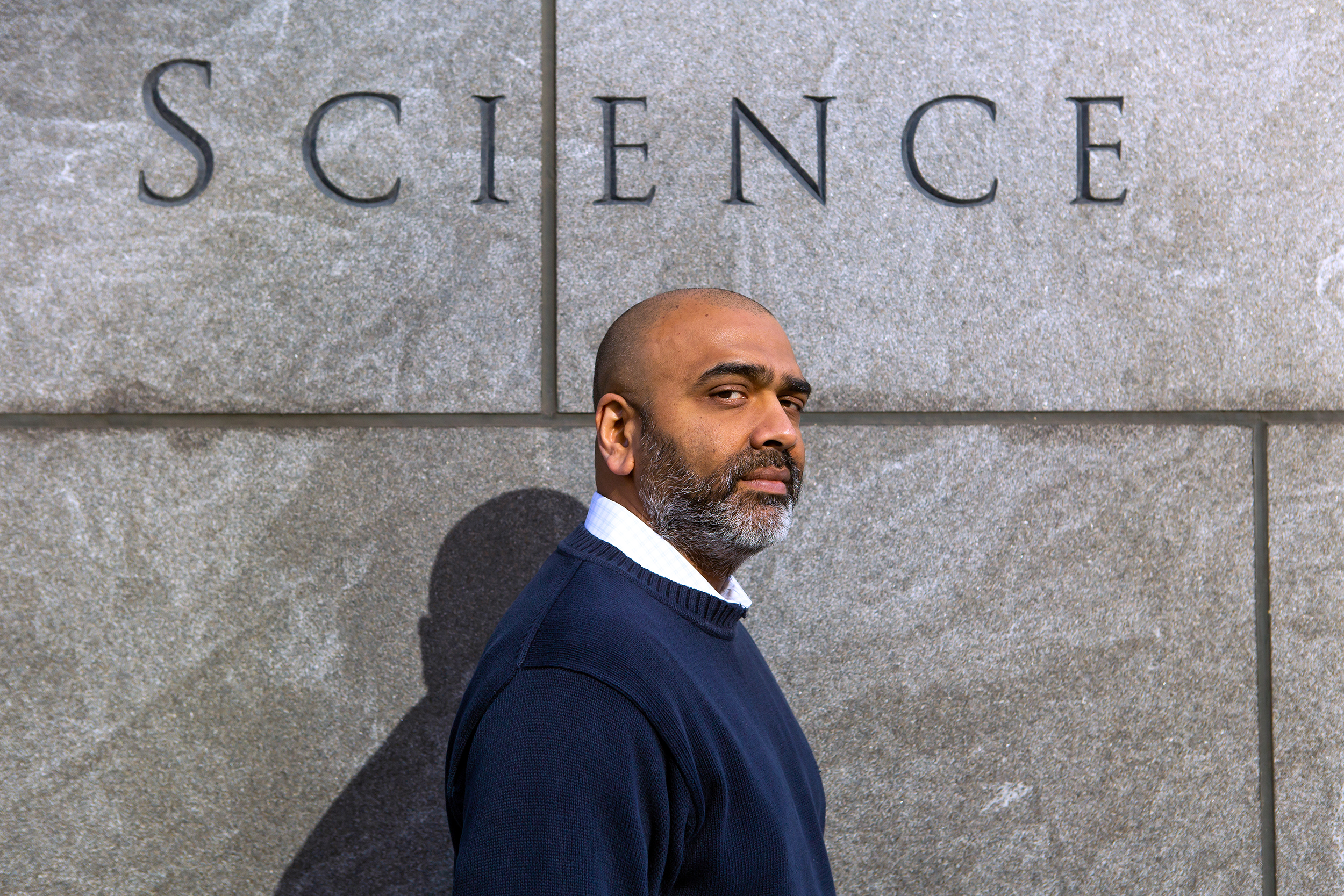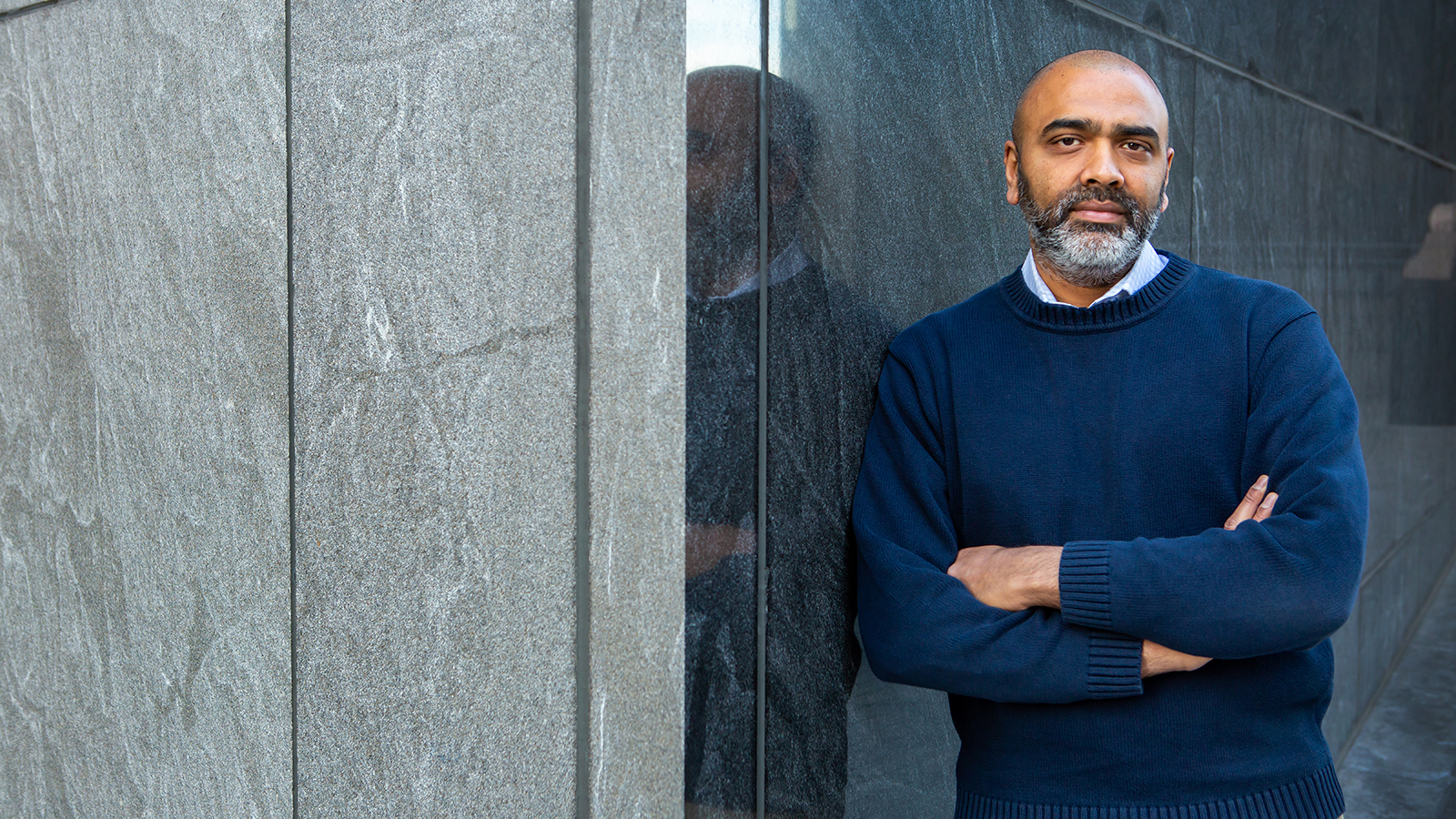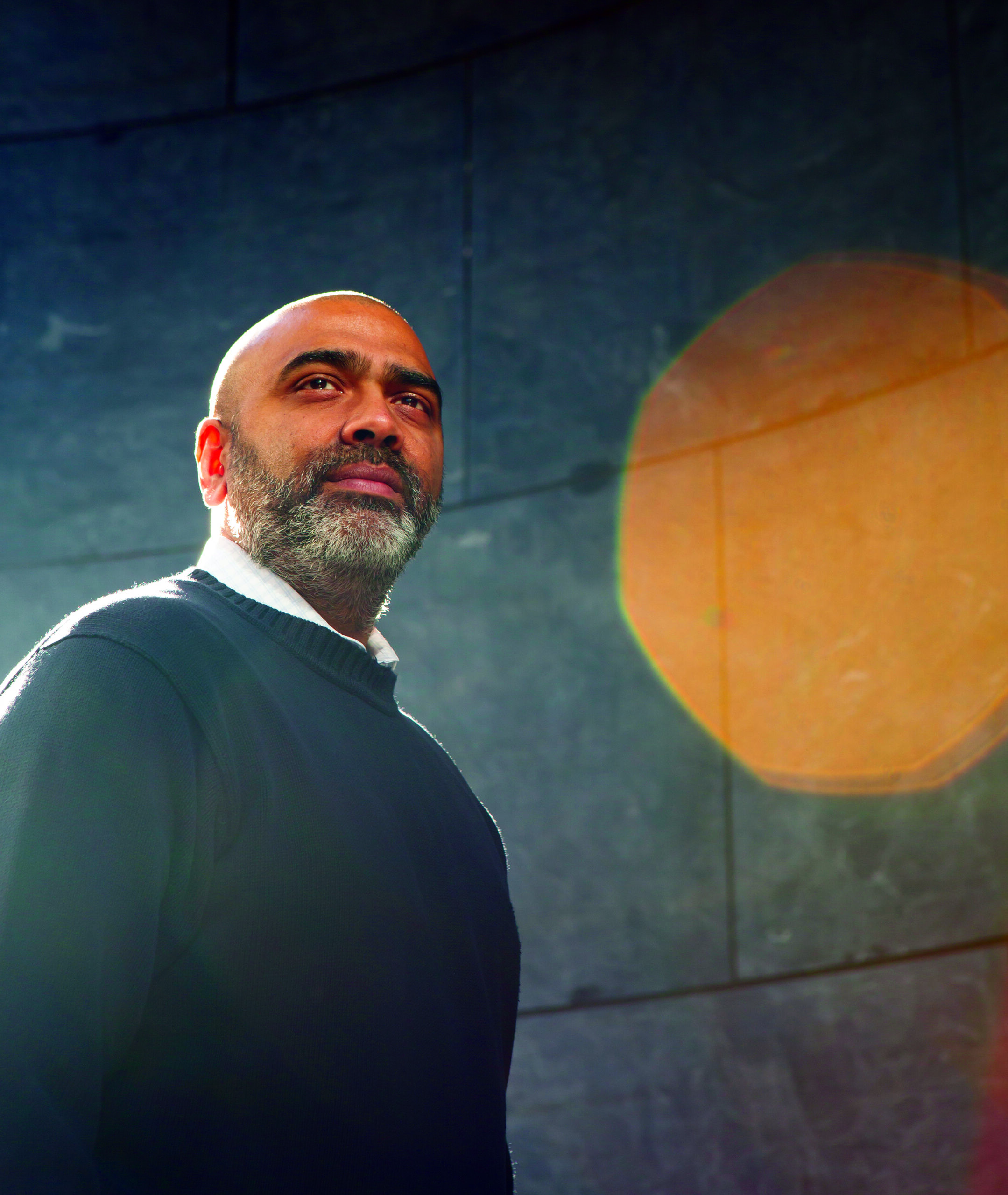The Scientist’s Scientist
Posted on Jan. 14, 2021
Sudip Parikh ’95, CEO at The American Association for the Advancement of Science. (D.A. Peterson)
Long before the time comes for masks and a vaccine, Sudip Parikh ’95 knows you need relationships that push science past political and global roadblocks.
by Eric Johnson ’08
There’s no separating science and politics, and few people understand that better than Sudip Parikh ’95.
A UNC-trained biochemist, Parikh took the helm of the American Association for the Advancement of Science last January, just a few months before the COVID-19 pandemic upended American life and forced some tough questions about the relationship between scientific expertise and political leadership in the U.S. The head of the AAAS functions as a kind of chief diplomat for the scientific community, building support for scientific research among policymakers and the public. “What AAAS does is try to build relationships before you need them,” Parikh explained in a Zoom conversation last summer. “You need those relationships long before you want to have a conversation about masks or vaccination or another difficult topic.”
The difficult topics have come hard and fast in Parikh’s first year on the job. There have always been controversies and tensions between science and public policy, from the Copernican Revolution to climate change. But the fierce political battles over the coronavirus response have tested Parikh and his colleagues like nothing else in the modern era. Governors, mayors and public health officials restricted daily life for millions of Americans on the advice of doctors and epidemiologists. Impatience with months of uncertainty and shifting public health guidance has threatened to turn scientific trust into yet another partisan wedge issue.
“The problem is that we don’t have a neat story to tell you all at once, because we’re doing it in real time,” Parikh said in an interview last year with After the Fact, a podcast from the Pew Charitable Trusts. In the early months of the pandemic, a scientific process that prizes trial and error clashed with a public hungry for clear guidance and fast solutions. “This is science in the service of society, and it’s messy,” Parikh said. “It’s going to be messy, and it requires this relationship-building and trying to build trust in a way that we’ve never had to do in real time before, ever.”
“I really enjoy this place where the science meets the rest of the world. Science itself is beautiful, but when you can take that beautiful science that inspires awe and have it become part of the world at large, it makes a gigantic difference in many, many more people’s lives.”
— Sudip Parikh ’95
It’s a fitting challenge for a man who came to Carolina focused on journalism and emerged with a love of scientific discovery. Parikh’s parents immigrated from India to western North Carolina to work in the state’s then-growing textile industry, and their son grew up with a Southern accent and ambitions for UNC. “I wanted to be the next Charles Kuralt [’55], which is hysterical for a guy who looks like me from Hickory, North Carolina,” Parikh said. He liked his reporting classes but found that he also loved advanced math. An academic adviser steered him toward applied science, and Parikh ended up working in Gary Pielak’s chemistry lab.
“I see a lot of first-generation college students,” Pielak said. “They don’t know what research is, then they learn, then they get addicted, and before you know it I’m writing letters of recommendation for graduate school.”
In Pielak’s lab, Parikh relished the freewheeling improvisation. He remembers trying to fix a fermenter with chemicals bought from a hardware store and having to learn a precise hand-mixing technique because the lab couldn’t afford the pricey equipment that would have done it automatically. “The camaraderie of the lab is fun!” Parikh said. “There’s technology involved, there’s all these smart people.”
And there are arguments — endless arguments.
“It’s that back-and-forth,” Parikh said. “There are a few lone geniuses out there, but most of us are not lone geniuses. Most of us need the argument, the having-a-drink-and-talking-about-it. I loved talking with these people, and I wanted to find more of these people.” He went on to earn a doctorate in biochemistry at Scripps Research in La Jolla, Calif., before making a turn toward public policy.
“What I found is that I really enjoy this place where the science meets the rest of the world,” he told After the Fact. “Science itself is beautiful, but when you can take that beautiful science that inspires awe and have it become part of the world at large, it makes a gigantic difference in many, many more people’s lives.”

(D.A. Peterson)
AAAS, Science have reach
The AAAS is certainly the right place to reach the world at large. Founded in 1848, the association now draws more than 120,000 members from more than 90 countries, helping scientists connect with one another and make their case to policymakers. Its flagship journal, Science, is widely regarded as one of the most prestigious peer-reviewed publications in the world, wielding immense influence over the direction of research, funding and public discussion on everything from astrophysics to zoology.
The journal has published path-breaking research from Albert Einstein and Edwin Hubble. It defended scientific independence at the dawn of the Cold War, crusaded for intellectual freedom in the McCarthy era and pushed for founding the National Science Foundation. It documented the Apollo space missions and the early years of the AIDS crisis, published the first sequencing of the human genome and weighed new evidence for life on Mars.
“There are only a few journals at the top of the heap that define what hot science is,” Pielak explained. “Science, Nature, Cell — these are the important journals. That’s where I go to find out what the hottest science is now.”
With Parikh’s backing, Science also has become a venue for intense criticism of political leaders who failed to follow health guidance during the COVID-19 pandemic.
“While scientists are trying to share facts about the epidemic, the [Trump] administration either blocks those facts or restates them with contradictions,” wrote former UNC Chancellor Holden Thorp ’86, who was named Science’s top editor in August 2019, in one of his earliest columns about the pandemic. “That kind of distortion and denial is dangerous and almost certainly contributed to the federal government’s sluggish response. After three years of debating whether the words of this administration matter, the words are now clearly a matter of life and death.”
“The older I get, I realize everything is a slippery slope. If you go too far, you’ve broken something. But I’ve also realized that you can’t let that stop you from doing something to make things better.”
— Sudip Parikh ’95
Such direct criticism of a sitting administration was a departure for the AAAS, but Thorp said he and Parikh thought it was justified. “We decided it was time to just start talking straight,” Thorp said. “[President Trump was] promoting the people who are trying to undermine public health. It’s dangerous.” The AAAS has always commented on public policy, and some controversy is inevitable when you’re covering the intersection of research and politics. But having a Science editor take regular aim at a sitting president was new.
And it speaks to one of Parikh’s deepest challenges as he guides the AAAS through a period of declining trust in major institutions of all kinds. A survey from Pew Research in 2019 found that almost three-quarters of Americans believe science, broadly defined, has a positive impact on society. Scientists actually rank higher than religious leaders or elected officials when it comes to confidence that they will generally act in the public interest.
But translating that goodwill into active support of scientific institutions — from research universities to public health agencies — is a tougher sell. As a percentage of gross domestic product, the federal investment in research and development has been declining for decades. “I think trying to build support for a scientifically informed future is a major challenge as it relates to public health and climate change,” Thorp said. “Developing an informed country that will stay informed as political whims ebb and flow. There’s a lot of stuff that needs to be built back.”
Parikh has plenty of experience building public support for science. From 2000 to 2009, he was an adviser to the Senate Appropriations Committee, helping lawmakers grapple with everything from the CDC budget to bioterrorism planning. The appropriations committee is a plum appointment for senators, attracting some of the biggest names in government. Parikh worked with Sen. Arlen Specter of Pennsylvania to greatly expand the budget for the National Institutes of Health and argue for federal funding of stem cell research. It gave him an insider’s view of how policymakers can help or hinder scientific progress and a keen understanding that science can’t be walled off from politics.
Not afraid to break things
“The older I get, I realize everything is a slippery slope,” he said. “If you go too far, you’ve broken something. But I’ve also realized that you can’t let that stop you from doing something to make things better.”
Parikh argues that widespread skepticism about coronavirus health measures should drive scientists to engage even more in the public sphere. “People shouldn’t trust you because you have a Ph.D. or an M.D.,” he said. “They should trust you because you’ve built a relationship based on shared values.”
He pointed to AAAS programs that put scientists in sustained dialogue with politicians, faith leaders, journalists and teachers. The association funds fellowships for scientists to spend a year working in a newsroom alongside journalists for major outlets like The Washington Post or the Austin American-Statesman, aiming to improve the quality of news coverage on scientific issues. Another initiative places scientists in congressional offices, where they learn the ropes of public policy and help lawmakers navigate scientific questions.

(D.A. Peterson)
One of his favorite initiatives at AAAS is Science for Seminaries, which offers training for future pastors and priests who will have to confront scientific and theological conflicts from the pulpit. “They go through a monthslong process with scientists where they exchange ideas and go through a lot of the most difficult scientific subjects,” Parikh explained. “Let’s talk about stem cell biology, let’s talk about what a physicist’s view of the origins of time might be. Let’s break bread together and talk about these really amazing things, because the evolution of the universe is a pretty cool topic whether you’re coming at it from a faith or scientific position.”
He also is a major advocate for cross-border cooperation in research. Before coming to the AAAS, he served as a senior vice president at DIA Global, a nonprofit that promotes international cooperation on drug development and other health care issues.
One of the ironies of the coronavirus era is that travel lockdowns, trade tensions and rising nationalism are all happening alongside deepening international ties among scientists. During the early months of the pandemic, even as Chinese leaders launched a disinformation campaign about the origins of COVID-19 and the Trump administration castigated the World Health Organization, Chinese scientists publicly shared the genome of the new virus and American researchers continued to work on WHO projects around the world. The ties that bind scientists aren’t completely shielded from politics, but they’re built on decadeslong relationships that tend to endure all kinds of geopolitical strife.
“Scientists have this unique ability to have honest conversations where they disagree and to try and work through them. It’s part of the scientific process,” Parikh said. He sees the pandemic as a critical moment to highlight the deep ties of the international scientific community and to emphasize how much progress would be lost if those cross-border collaborations came to a halt.
“Especially in times when there are political challenges, that’s when we have to become more proactive about building peer-to-peer relationships around the world,” Parikh said. “Because this is not the last time we’re going to have to work together through a crisis. Having that collaboration, that conversation, might speed up the path to a cure, might help prevent an environmental tragedy, might positively affect climate change.”
Still, he understands why those worldwide ties have become a source of suspicion to politicians and citizens focused on the downsides of globalization. Parikh’s parents came from India to Catawba County for better jobs and better education for their kids, but Parikh watched as the textile industry that drew his parents halfway around the world was steadily decimated by international competition.
“My dad worked in textile mills from 1965 to 2010, which means he pretty much got laid off every other year,” Parikh recalled. “And you saw that as a direct result of [trade] treaties, of globalization. There were definitely advantages to the United States from some of those treaties, as well. We did grow, we did prosper. But there were very real consequences around the country and certainly in Hickory.”
When leaders focus on a rising GDP or the falling cost of consumer goods, they risk alienating whole communities that have seen their factories close up and young people move away. That sense of being left behind and ignored feeds a deepening distrust of big institutions and distant experts. “It’s that ‘for all’ part that becomes really important,” Parikh said. “Well-being for all, economic prosperity for all. You have to realize that intellect and wisdom are not concentrated on the coasts and not concentrated in universities. They are spread out over all these areas, and what’s important is having mutual respect. We can sort of lose that living in Washington or Chapel Hill, and we have to make sure we never do.”
Eric Johnson ’08 is a writer in Chapel Hill. He works for the College Board.
Thanks for reading the Carolina Alumni Review
Carolina Alumni members, sign in to continue reading.
Not yet a member? Become one today.
